Ann Sanner of the AP is reporting that efforts to repeal changes to Ohio’s election laws, including shortening the early voting period, have failed to gather enough signatures. Opponents fell only 9578 signatures short out of 231,150 required
Author Archives: gronke
Voting by iPad
Not sure if other counties have tried this, but five counties in Oregon used iPads and portable printers to help disabled voters and other citizens who would have difficulty filling out a paper ballot.
The AP story is here: http://www.cbsnews.com/8301-505123_162-57319939/oregon-looks-to-ipads-to-help-disabled-people-vote/
Some election day photos from Kyrgyzstan presidential election
“Mobile” voting the day before, for those voters who cannot make it to the polls. 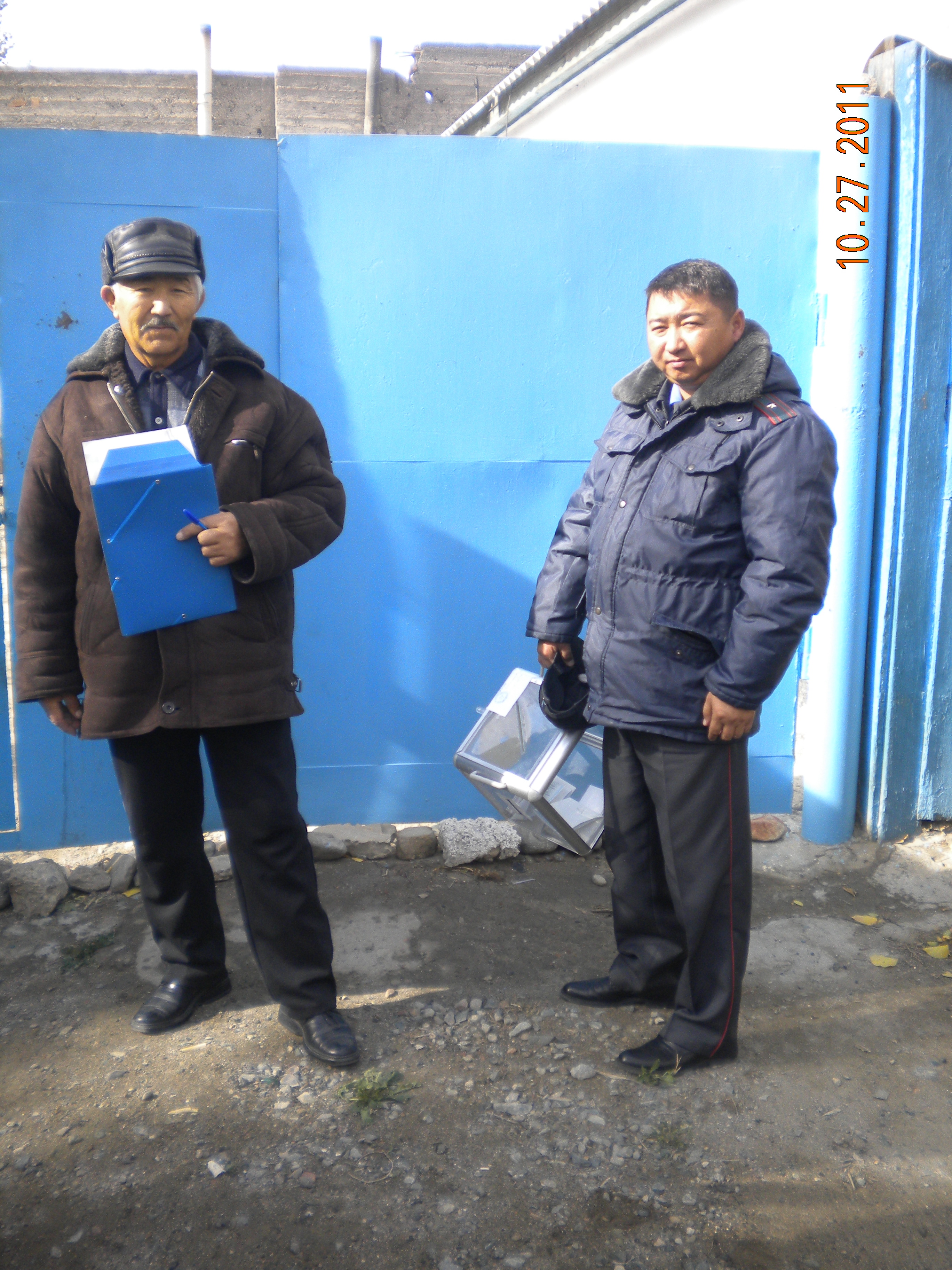
A Ballot box. 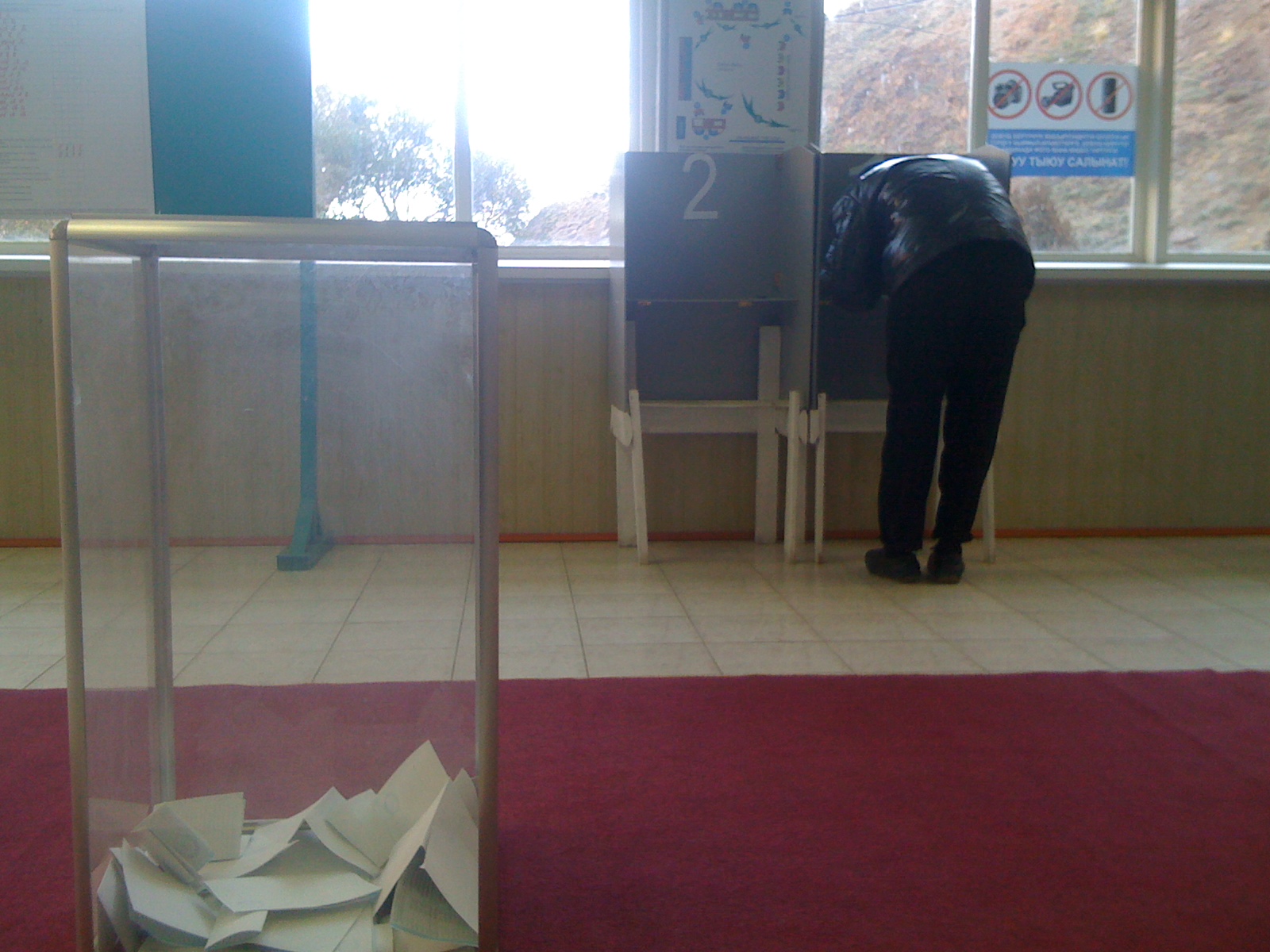
How they treat election observers in a rural village in Kyrgyzstan. 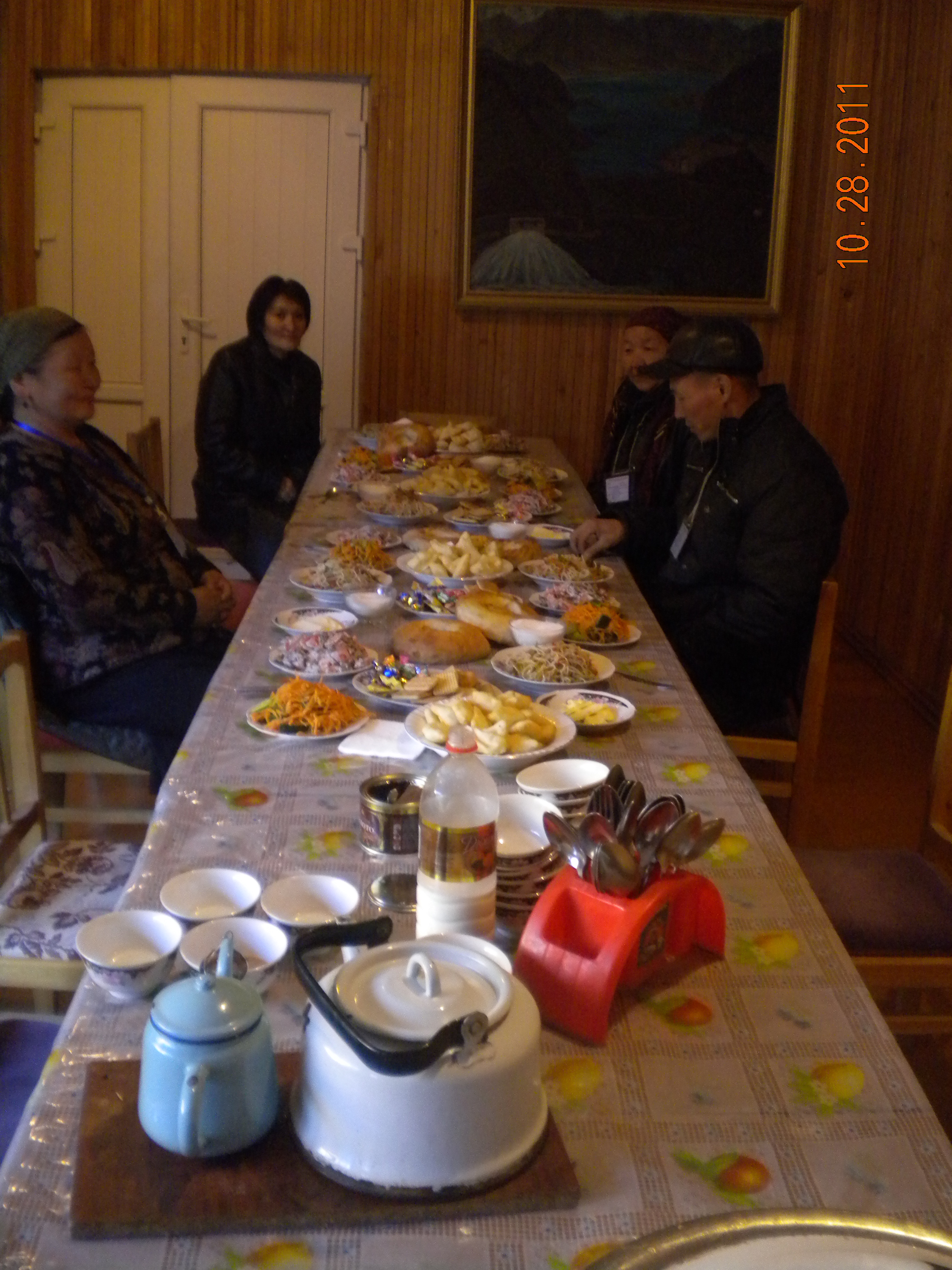
Voting in Balichky, Kyrgyzstan. 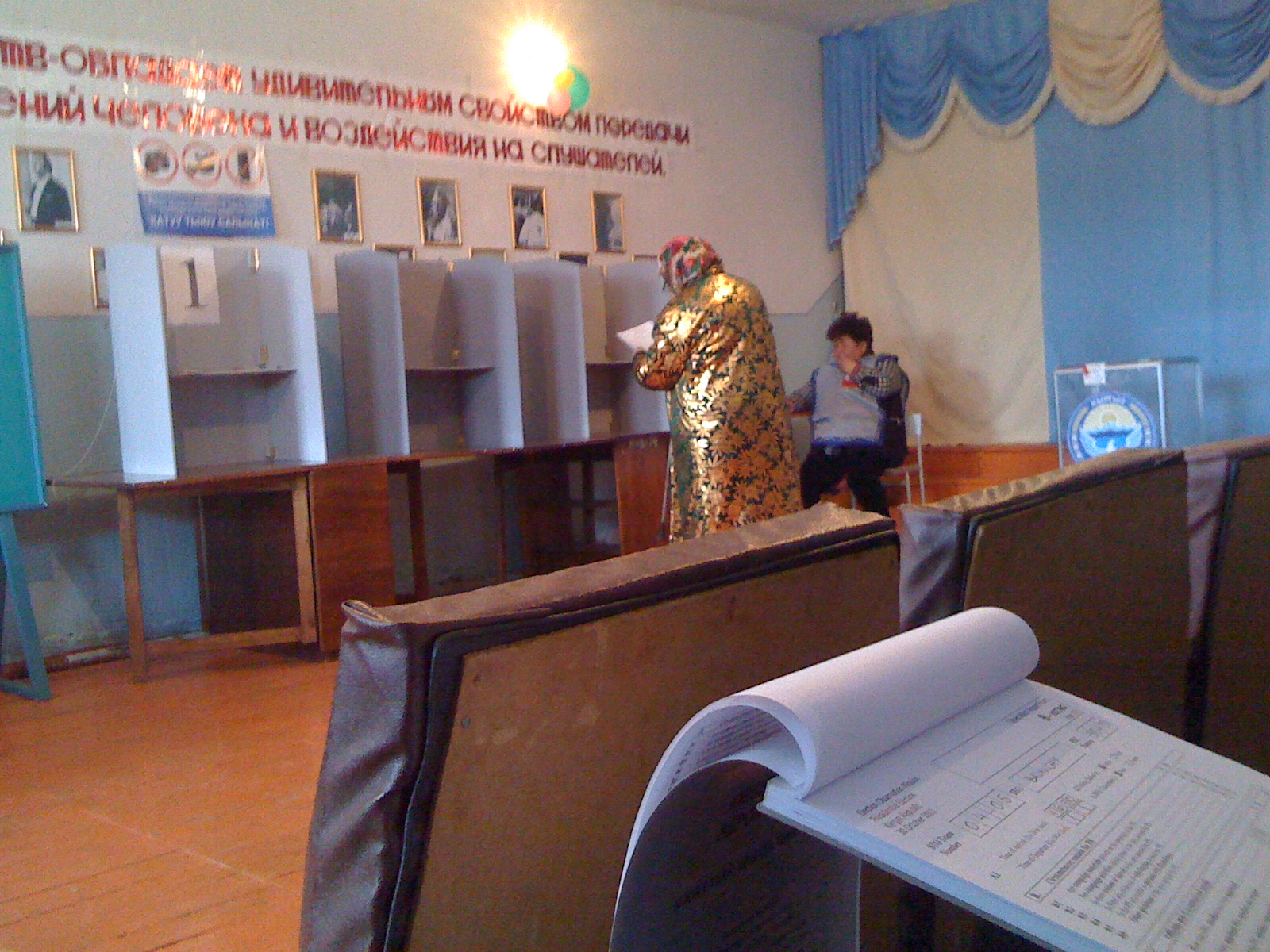
The ballot count on election night.
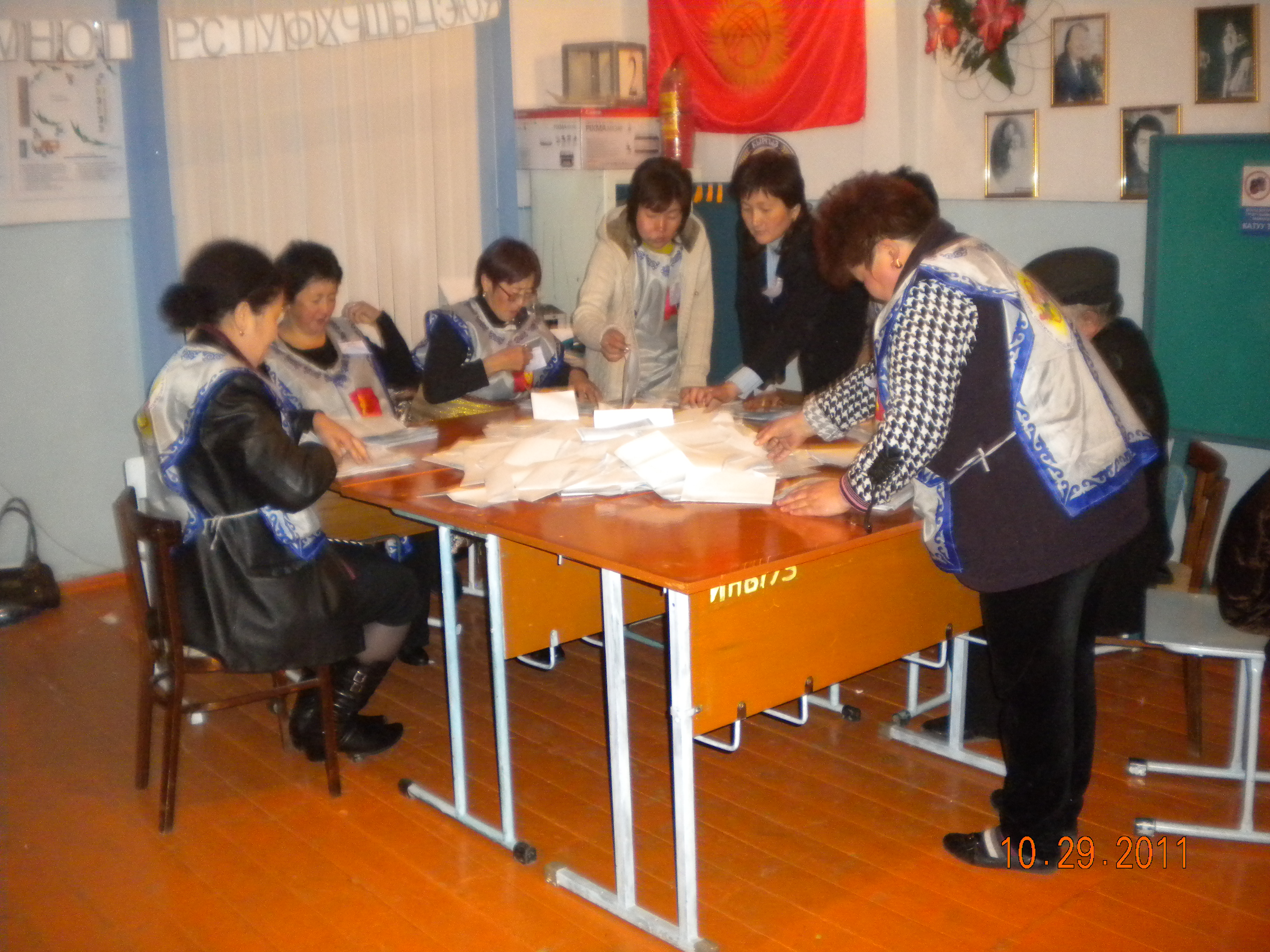
Update on Kyrgyz election
My election day was uneventful but long. I spent the first day in a beautiful and remote village north of Balikchy. Voting day was a kind of community event, and we were treated like honored guests. When I get back to Bishkek, I’ll post a photo of the spread; not the same thing I encountered in 2008 when observing with Mike and Thad.
The second half of the day, I was in the city. A lot of sitting, standing, and filling out forms. Election observation is not exactly romantic!
Reports on the election are starting to come in:
Upcoming Presidential Election in Kyrgyzstan
I am in Bishkek, Kygyzstan, serving as a short term observer to the upcoming Kyrgyz Republic Presidential election. This is my first time in Central Asia, and I am trying to absorb the culture, language, and politics all at once.
A few other details that may be of interest to our readership. The party system is highly fractionalized, more so than any system I am familiar with. In the most recent parliamentary elections in October 2010, the top five parties (all of which won seats–there is a 5% national threshold for representation) garnered only 37% of the vote. There are nearly 100 political parties, many of which are highly personalistic.
A brief description of the 2011 presidential contest is here; 83 candidates were nominated by parties or were self-nominated and 23 are on the ballot. General information on their election system can be found at IFES.
3 have withdrawn since the ballots were printed, and rather than reprinting, the precinct election commission (PEC) members are supposed to manually ink over the names and the box on each ballot. That will be interesting to watch on election day.
Finally, I am a first timer at election observation. Perhaps that is why I have been deployed to Balykchy, a town of 40,000 people onIssyk Kul, the second largest alpine lake in the world. The town is apparently so-so but the area absolutely beautiful.
The most recent treatment of politics in this region is a book by Eric McGlinchey, Chaos, Violence, and Dynasty (Pittsburgh Press, 2011). McGlinchey’s primary thesis Continue reading
Allegations of voter fraud in Indiana don’t add up
We need to invent a catchy phrase in the elections community to describe overblown allegations of voter fraud. As Lorraine Minnite has documented, most charges of fraud don’t stand up to scrutiny. It’s important that Americans have faith in the security and integrity of the ballot, but it’s just as important that overblown charges of “fraud” be challenged.
Take the latest series of charges and counter charges regarding voting irregularities in Indiana. Rick Hasen noted the “latest salvo” from the state GOP chair.
I am careful to use the word “irregularities” and not “election fraud” because, regardless of the rhetoric, even a cursory examination of the list of charges only reveals one case that rises to any level of concern: allegations regarding absentee ballot fraud for a single UOCAVA ballot. (I’ve been searching fruitlessly for the reasons why there are 65 counts in the indictment; some stories refer to absentee ballot “applications” while other stories note a single ballot in question.) Continue reading
2010 FVAP Report + Data Release
I can’t add much to this excellent report by Doug Chapin at the Program for Excellence in Election Administration.
I will out myself as Geek #1, but I suspect my friends in the community know this already. The demographics on the military were as of 2008, and were obtained from a slide presentation from the Defense Manpower Data Center.
The comments about income and region were drawn from a project I worked on with the Triangle Institute for Security Studies Continue reading
More on UOCAVA and caucus participation in Iowa
I have gotten a number of off line questions about my posting last week proposing an online discussion “caucus” that would allow military and civilians overseas to participate in the Iowa (or other) caucuses.
It’s definitely technically feasible. The most challenging part would be validating the participants as registered voters in the state, but that’s mainly a data lift. It’s not hard with the right programming skill and a partnership with a political party or the Secretary of State’s office.
The problem now is timing–with a likely Iowa caucus date of January 3rd, there is really no way to establish partners, set up a website, contact potential UOCAVA participants, and validate registration.
Military (and overseas) voters and caucuses. There is this crazy new invention called the “internet”…
Ben Smith of Politico wrote today (in a follow up to an article in August) about an interesting objection coming from the Reserve Officers Association targeted at the Iowa GOP and the Iowa caucus. The ROA wants to assure that their members have every opportunity to participate in the political process, and that includes helping to select the parties’ nominees for president. (It’s not mentioned in the story, but this may be an even more important issue in states and localities that are non competitive and where a party nominating system is tantamount to election.)
There is nothing new about criticism directed at caucuses because of their exclusionary character. Caucuses exist as a method of face to face discussion, deliberation, and choice. This is what leads some, such as Caroline Tolbert, a political scientist at the University of Iowa (coincidence?) to defend the continuing role of caucuses in our election system.
Caucuses are most often criticized because they only represent the most politically active, and in Iowa as in most states, that skews toward older, wealthier, and whiter citizens. Using the military–one of America’s most diverse political institutions–as a lever to attack the Iowa caucus is a delicious political irony. I can’t help but think of the current brouhaha over no-excuse absentee ballots in Colorado. The legions of “inactive” voters in Colorado surely skews toward poor citizens, highly mobile citizens, and language minorities. No one seems to be worried when these citizens are moved off the active rolls too quickly. But when UOCAVA voters are moved off the rolls, suddenly you have bipartisan support for restoring voting rights!
Enough about underlying political motives. What is more surprising is that Smith, and the Iowa GOP, aren’t thinking very creatively about how they could increase participation by registered Iowans who are out of state on caucus day. There is this new thing I’ve heard about .. it’s called the Internet….
Vote by mail in Santa Barbara City Council
A natural experiment may be occurring in Santa Barbara. The City Council approved an all vote by mail election for the council election (to save money), which pits three conservative councillors against seven challengers.
The ballot envelopes are postage paid which should increase turnout. County officials are hoping for an increase in turnout from 2009, which they report was “nearly half of registered voters.”
The city clerk’s elections website is here but it’s not clear if ballot envelopes included postage in 2009 (hence no change in 2011).